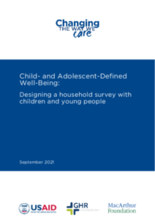In recent years, there has been increased understanding of the harmful impacts of residential care, particularly institutions, such that many countries have adopted laws and policies promoting safe, nurturing family-based care aligned with global standards and best practices. Global and regional momentum, in part driven by investments by larger donors such as the European Union, USAID, and UNICEF, has helped to build energy for change—care reform—at a national level. Civil society and, increasingly, young people with lived experience, have been key partners of care reform at the country, regional, and global levels by piloting and modeling family strengthening interventions; reintegration and family-based alternative care; developing and promoting standards of practice, guidance, and training; and building capacity of governments, communities, and families.
This study describes the process used for designing and facilitating focus group discussions with children and young adults, that informed the household survey design.
Related:

